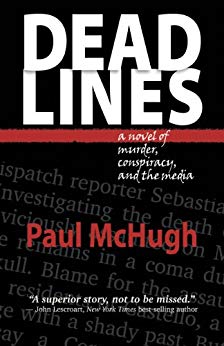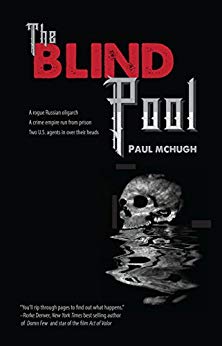
Repeal the law of gravity, and it’s no surprise if somebody flies.
That’s a big reason why it’s a dumb idea to cram a dose of magic into an otherwise realistic book. Do so, and any problem a protagonist faces can be solved quickly, with the merest wave of a wand. Plot tension begins to spurt from your tale like water squirting out of a fire hydrant decapitated by a wayward bus.
Your readers can no longer trust any given character’s inner life shall prove pivotal in what occurs in your story. They’ll suspect that if the author needs to spackle over some gap in ordinary human potential, or logic, or if he lusts for a high-octane plot twist, he’ll grab a glue pot and then stretch out his arm for that sparkly jar of magic.
Not seek to puzzle out a solution to his artistic problem in a more substantial manner.
Magic does just fine if you award it a realm that’s fully and completely its own. Wish to issue a decree that permits everyone in your world to fly? Well, grand and lovely! Off we soar into the wild blue yonder. (But to make that situation a tad more interesting, can we have at least one guy named Icarus? How about, Lieutenant Colonel Icarus, that’s got a ring to it.)
Gaga over the Lady Galadriel

Don’t get me wrong. I’m a guy who, in his mid-teens, read “The Lord of the Rings” – all three books – twice straight through. A hell of a heap of pages. But I didn’t want Tolkien’s tale of adventure in Middle Earth to ever quit, so I skipped on past “The End” to begin his fabled trilogy afresh.
Young folk lust mightily for a world imbued with magic. That way, their best fantasies can become consequential in an instant. Snap fingers, and voila! Instead of having to wait and wait and wait for the partial and plodding manifestations that are almost the entire portfolio of adult achievement.
When the famed Harry Potter series thumped onto bookstore shelves, I was quite a bit older and far less impressed by yarns of enchantment. I do still applaud J. K. Rowling for one act of consummate alchemy, though. She scraped a highly repetitive, laboriously teased-out fantasy series up into a heap of earnings somewhat north of a gajillion dollars. And so did George R. R. Martin.
All well and good, both for these folks and for their legions of ardent fans.
A Planet of the Fantastic

But fantasy should remain, in my view, a genre set distinctly apart. Quarantined, as it were, in its own rainbow bailiwick. Charismatic sorcerers shall therein be granted astounding magical powers, bad guys score a few dark arts of their own, and an epic war be set afoot. (Y-A-W-N…!) Well, such a tale can at least generate interest on a metaphorical basis. Even if you don’t admire this stuff, one must still admit that it boasts a venerable tradition, one as ancient as the Old Testament.
Let us thrust ahead further into the glimmering weeds, to acknowledge utility and artistry in the “magic realism” subgenre, as exemplified by the works of Gabriel García Márquez, particularly, Love in the Time of Cholera (my favorite by him). I would argue that Gabo used his less-phony magic to address emotional truths, to underscore reality, not cheat or obliterate it.
However, not every writer is or can be nearly so deft as he.
Triumph of the Usual

Less gifted writers (yep, I do number myself among them) fare far better when their model of reality is forced to rear up onto its own two hind legs and deal with whatever comes its way without resorting to wand-waving maneuvers of any stripe. That’s because, A) humans are fabulously tricky when simply left to their own devices and because B) so-called ordinary reality is already splendidly magical, just in and of itself.
To me, it’s far more interesting to watch characters wrestle with their issues without cranking down a deus ex machina from a proscenium arch whenever an act happens to grow fraught. That way lies melodrama!
Greater depth and significance are won when a hard choice is made, or a natural human virtue brought to life by a character. But if a sprite pops by amid the tumult to scatter her salvific sparks of pixie dust? Pffft! Your story has just gone weightless
Shamus Shoots Self in Foot

Without naming any names, here’s a recent case-in-point. I read a 2019 detective novel that presented a lovely example of what I’d call real life’s ordinary magic, promptly followed by an instance of shameless cheating and a plot-vaporizing magic of the kind I so deplore.
In the first instance, the detective gets out of bed right after having a dream in which he’s flying high up above a crime site. As he sips his morning coffee, he realizes that his subconscious has just prompted him to recall a datum that he’d uncovered earlier but ignored – that a crop duster pilot had made an early flight near that location. If he can find out what that pilot observed, it just might prove useful in solving the case!
An excellent passage. It’s indeed how our brains work. That moment of realization adds dimension to the personality of the detective, to his capabilities and to his story, without eroding any of the novel’s plot tension.
Yet soon after, the detective has an unfortunate meet-up with the sister of his deceased wife, a woman who boasts of supposedly psychic perception. She has the Gift, by which I mean, The Eye. And said woman proceeds to point his suspicions in the proper direction. BLAT-TT! Hit the gong. Get the hook. The author has just holed his story below the waterline. Suddenly all the virtues of a good detective: curiosity, persistence, empathy, perceptiveness, logic – have been subverted. Supplanted by a cheating, magical fantasy.
A Defect in the Detect

How shall this gumshoe solve the next problem he runs across? Read tea leaves? Buy a Tarot deck, cut the cards? Sacrifice a goat and divine its entrails? Fly to Cumae and chat with a sibyl? Who cares? Myself, I could not care any longer. Yet I refused to put this book down. Instead, I hurled it across the room with great force.
I’m not saying psychic characters can’t be present in a realistic novel. After all, that shawl-and-scarf-clad fortune teller with a crystal ball on her coffee table is a familiar enough trope in real life that she’s become a cartoonist’s cliché. I’m not even saying that supposedly psychic characters can’t be allowed to make remarkably shrewd guesses from time to time. Yet their inputs should be well within the parameters of rational probability. And the rest of their act should be viewed as a shtick, no more, no less.
See, I’ve done my research!
Confessions of a Psychic’s Sidekick

In my mid-twenties, I knocked about with a professional psychic for a few years. I didn’t buy into her work so much as invest huge swatches of my time in watching her perform before admiring crowds of clients. She was a charming woman, tall, striking, voluble and witty. (This was during my early freelance period, back when this lady succeeded way-y better at her gig than I did at mine.)
A minor key to her success was that she happened to be a graduate of The Berkeley Psychic Institute, with all the woo-woo notions thereto appertaining. But in my opinion, the skills that truly blazed her path to victory were theatric. Prior to attending the BPI, she’d been a founder and leader of a small California theater company. And theater was the Rx she spooned to her clients, in heaping doses.
Learning to Spell

Her “readings” were improv scenes in which she slurped up all of her client’s “tells” – their cues and clues – and proceeded to weave those bits into a narrative that made a dreamy kind of sense. Issues suddenly had explanations attached. Chaos became more organized. Solutions drew within reach, with Alice-in-Wonderland “Drink Me!” labels on ‘em. The clients won daily visualizations and virtual exercises. And inside this virtual realm, they began to heal. And in the arena of daily life, they started to relax. Theater therapy had worked wonders, and they felt that their affairs had finally been “sorted” – as the Brits say.
Yet her career eventually tanked. Her first (literal) hits came because, within a year, she suffered a pair of automobile accidents. Her clients began to ponder why she’d never seen those wrecks coming, and thus been able to cannily evade them.
Well, she wasn’t that kind of psychic! Perhaps no one is. At least, not often and not for long.
Yet the sort of psychic she actually turned out to be was far more intriguing. Against what I saw as high odds, this lady revealed herself as a self-policer. Late in our friendship, I recommended that she enroll herself in college psychology classes in order to examine her practice through a new type of lens. After a while she indeed did so, whereupon she determined that her Great Oz routine had been founded on humbug. She shed belief in her own sorcery, which had been a vital ingredient. She could no longer sell to others what she could not buy herself. Profitable as her act had been, it collided with an expiration date.
Perhaps to avoid meeting her former students and clients and feeling required to explain her grand transition, she moved out of town, out of state, and then out of the country. Ultimately, I lost track of her professional trajectory. Still, I’m confident that no crystal balls are involved today.
The Key Question

But now let me ask you something, as a reader.
Whom would you dub the most interesting character? A psychic endowed with fabled, inexplicable magic power? Or a psychic with a power that has an easy explanation, although it’s one she evades for years, but then finally confronts? Which character’s issues might make a better story? Well, what would make for the best plot? What story might provide a reader with more insight about our genuine human condition, and offer many more useful take-aways?
That’s why, when it comes to magic, I stack my chips where I do.








